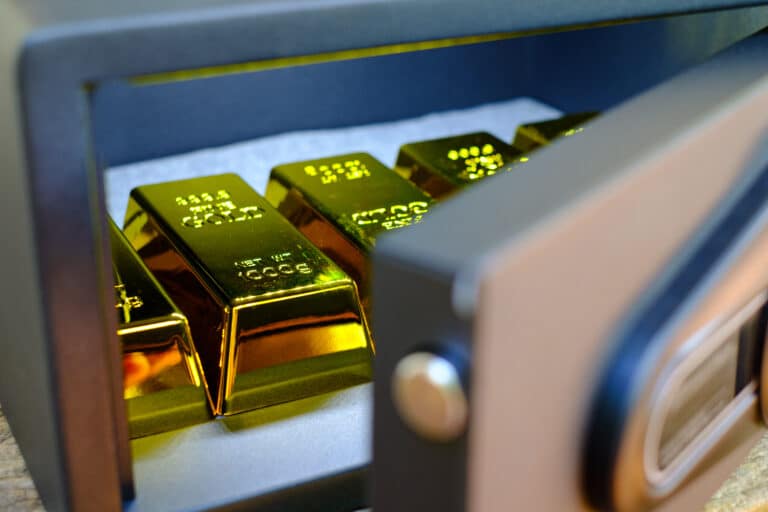As a precious metals investor, one of the most important decisions you’ll make is where to store your assets. The safety of your precious metals is paramount, and deciding between insured and uninsured storage options can be challenging. There’s no blanket answer when it comes to choosing between the two because it’s not just about finding a place to store your investments — it’s about peace of mind, security, and financial practicality.
Whether you’re a collector guarding priceless heirlooms or looking for a safe place to store your investments, understanding the dynamics of insured and uninsured storage is key. Keep reading to explore the pros and cons of each storage option so you can make an informed decision that fits your investment goals and budget.
What Is Insured Storage?
Insured storage is a service that provides insurance coverage for the items you store. This means your belongings aren’t just stored but are also financially protected against unexpected events.
The Advantages Of Insured Storage
The most attractive aspect of insured storage is undoubtedly the security it provides. Knowing that your belongings are protected can be invaluable, especially if you store items with high monetary or sentimental value.
In the unfortunate event that your valuable items are lost, damaged, or stolen while in an insured storage unit, the insurance company would step in for financial compensation. This amount is usually equal to the market value of the items at the time of loss. This means that if your precious metals increase in value significantly while in storage, you would receive compensation based on the increased value to ensure that you don’t lose out on potential gains.
Potential Drawbacks Of Insured Storage
Insured storage units tend to be more expensive than their uninsured counterparts and may not be affordable for everyone, especially for long-term storage needs. If you’re storing items with little monetary value or replaceable items, the additional cost of insured storage may not be justified. Before choosing insured storage, be sure to assess the value of your possessions, both financially and emotionally.
Allocated vs. Unallocated Storage
Another important consideration when looking into insured storage options is whether you should opt for allocated or unallocated. Here’s what you need to know about the two types:
| Allocated Storage | Unallocated Storage | |
| Description | Allocated storage refers to a storage plan where the exact type of bullion put into storage is precisely what the investor will receive upon withdrawal. Every item stored is individually marked with the investor’s name and unique bar number. | Unallocated storage, however, does not require physical separation of items. This means that what the investor puts into storage may not be the exact item they receive upon withdrawal. Instead, they will receive a similar item of equal value. |
| Cost | Allocated storage tends to come with higher costs due to the specific identification, tracking, and management of each item stored. | Unallocated storage is generally more affordable, as it saves on segregating and tracking individual items. |
| Investment Value | Allocated storage is considered the safest way to store your investments. | Investing through unallocated storage still provides direct access to precious metals but without the benefits and reassurances of knowing you’ll receive the same item upon withdrawal. |
Types Of Insurance Coverage Available
All-Risk Insurance is a comprehensive insurance policy that covers all risks of loss or damage to your precious metal investments, except those specifically excluded. This type of coverage is typically more expensive than other insurance options but provides the highest level of financial protection.
Named Peril Insurance covers specific risks such as theft, fire, natural disasters, or other events detailed in the insurance policy. This type of coverage is typically less expensive than comprehensive insurance but offers less complete protection. Named Peril insurance is a good choice if you have a smaller investment amount.
Storage insurance is specifically designed for precious metals, providing financial protection against loss or damage. This type of insurance coverage is typically offered by storage providers and is included in the rental fees for the storage unit.
While FDIC insurance doesn’t directly cover precious metals investments, it can provide financial protection for funds used to purchase precious metals. FDIC insurance covers deposits in checking, savings, and other bank accounts up to $250,000 per depositor per insured bank. FDIC insurance is a good choice if you use funds from a bank account to purchase precious metals.
Available Insured Storage Options
Insured storage options offer precious metals owners numerous benefits — each with its own fees and insurance coverage. It’s important to carefully weigh the pros and cons of each storage option and choose the one that best fits your specific needs and circumstances.
Precious Metal IRAs
Precious metals IRAs are a popular investment option for those looking to diversify their portfolio and protect their assets. The IRS requires that the physical precious metals held in a Precious Metals IRA be held in an approved depository.
These depositories are typically highly secure facilities specifically designed to store precious metals. They offer advanced security measures, including 24/7 monitoring, access controls, and climate-controlled units.
Precious metals IRA insurance policies typically cover loss or damage that may occur during storage. The amount of coverage may vary depending on the policy offered by the storage company. It’s important to carefully read and understand the terms of the insurance policy to ensure that your precious metals are adequately protected and meet IRS requirements.
Insured Vault Storage
Vault storage is designed to provide maximum security and protection against theft and damage. They typically also feature advanced security measures and are usually in secure locations, such as banks or specialized storage facilities.
Precious metal assets are kept in segregated or assigned storage, guaranteeing individual ownership. Although vault storage is considered one of the safest options by investment experts, the associated fees and insurance costs should be considered beforehand. When you choose insured vault storage, you have the peace of mind knowing that your valuable possessions are protected at all times.
Safety Deposit Boxes
Most banks and financial institutions that offer safety deposit boxes provide insurance coverage to protect your contents. This insurance coverage is usually offered as an additional service and is included in the rental fees.
The amount of coverage may vary depending on the bank or financial institution and the policy offered. It’s important to carefully read and understand the terms of the insurance policy to ensure that your precious metals are adequately protected.
Safety deposit box fees are typically lower than other insured storage options, making them a viable solution for individuals with smaller investments. The contents of the safety deposit box are also only known to you and the bank or financial institution providing the box, ensuring your investments’ confidentiality.
Understanding Uninsured Storage
Uninsured storage, as the name implies, doesn’t provide insurance coverage for the items you store. It’s a rather simple approach that’s primarily about creating space for your belongings without any additional coverage.
The Benefits Of Storing Your Precious Metals In An Uninsured Location
Since there are no added insurance costs, uninsured storage units are generally less expensive than their insured counterparts. This can be an attractive option for those on a tight budget or those storing items of low value.
Uninsured storage units are also easy to manage. Without the constraints of insurance policies that dictate what can and cannot be stored, you may have more freedom in choosing what items to store.
Because there’s no additional insurance paperwork to complete, it’s a straightforward service that provides a place for your belongings and little else. For those who prefer a no-frills type of storage, uninsured storage units might be the right choice.
The Risks Associated With Uninsured Storage
In the unfortunate event that something happens to your investments, uninsured storage provides no financial safety net to cover the cost of your lost items. This lack of protection can be harsh, especially if the items you had were of high value, whether financial or sentimental.
Services like round-the-clock surveillance and secure access controls aren’t often part of the uninsured storage package. This means your belongings could be exposed to harsh weather conditions, increasing the risk of damage from humidity, excessive heat, or cold. Without strict security measures, the risk of theft is also potentially higher.
Uninsured Storage Options To Choose From
When it comes to uninsured storage, there are several options available, each with its unique features and benefits. Remember, while these uninsured storage options can be cost-effective and convenient, they don’t provide financial protection for your stored items. It’s important to weigh the cost savings against the potential risk of loss or damage when considering these options.
Storing At Home
Home storage is a popular option among investors as it offers a cost-effective solution by eliminating monthly storage fees, allowing investors to save money. Investors who store their valuables at home enjoy the added benefit of always having their assets at their fingertips. They can quickly access their assets without traveling to a storage facility, which can be especially beneficial for investors who need to access their assets frequently.
However, homeowner’s or renter’s insurance policies may not provide adequate coverage for valuable items stored at home.
If you choose to store your items at home, invest in a fireproof safe or other high-quality storage device. It’s also important to check your inventory regularly and invest in a home security system with motion detectors and surveillance cameras to deter potential thieves and provide evidence in the event of theft.
Third-party Storage Companies
Storage companies often have advanced security measures attractive to investors, giving you peace of mind that your belongings are protected from unfortunate events. They also offer flexibility regarding how long you can store your items, providing short-term and long-term storage options so you can choose the duration that best suits your needs. These companies also often offer flexible payment options, such as monthly or semi-annual payments.
However, it’s important to note that the ongoing costs of renting a storage unit can add up over time. Limited access periods may also mean that individuals cannot access their property anytime. They also don’t typically offer insurance policies to protect your investments, leaving you high and dry in a worst-case scenario.
What You Should Consider When Picking A Storage Option
As a precious metals investor, choosing a storage option is important to ensure the safety of your assets. Here are some of the key points to keep in mind:
- The value of your precious metals and the level of financial protection required.
- The security measures are in place at the storage facility, including surveillance and access controls.
- The reputation and track record of the storage provider and their experience with storing precious metals.
- The insurance coverage offered by the storage facility and any additional policies required for comprehensive financial protection.
- The accessibility and convenience of the storage option, including the hours of operation and location of the storage facility.
- The cost of the storage option, including monthly or annual fees and any additional costs associated with insurance coverage.
- The potential risks associated with storing precious metals at home, with third-party vendors, and with uninsured storage options. Evaluate the risks to determine the best storage option for your specific needs.
- The digital security measures for storing digital data include encryption, secure data transmission, and digital security protocols.
Secure Your Precious Metal Investments Today
If you’re looking for a trusted partner to help you invest in and store your precious metals investments, Noble Gold Investments is a leading firm with decades of experience. We work with IRS-approved depositories, ensuring that your investments comply with federal regulations if you’re looking to invest directly into a precious metals IRA. We also offer a range of gold, silver, platinum, and palladium bars and coins available to store at home.
Don’t wait any longer. Give us a call today at (877) 646-5347, or click here to open an account and experience firsthand why our clients consider us the best. Our staff is ready to help you with your investments and answer any questions you may have.







